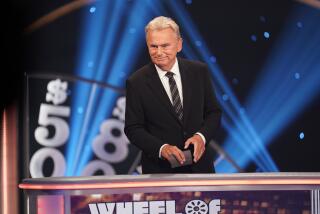Give Greed a Sporting Chance
- Share via
In Quincy, Mass., last August, the New Hibernia Bank set up a wheel of fortune in its lobby and invited its depositors to play for interest rates. More ornate than the one that Vanna White spins on television, the wheel had been salvaged from an old saloon. Somebody musical--presumably the assistant branch manger, but maybe one of the more jovial tellers--played the fanfares on an accordion. Any customer who bought a 1-year certificate of deposit for $1,000 earned the chance to spin the wheel for rates of interest as high as 18%, 19% and 20%. Not much of a chance, of course--most of the numbers on the wheel paid the usual 8%--but more of a chance than anybody was likely to get from Wall Street or the dog track.
The proposition deserved a lot more notice than it received, and I remember wondering at the time why an ambitious Harvard professor didn’t seize upon the idea as this year’s theory of economic deliverance.
Most Americans delight in gambling, and they recognize capitalism as a largely irrational means of distributing the nation’s wealth. Think of their gratitude if they knew that every day in every place of business they stood a chance of hitting a jackpot. Imagine doctors spinning for the price of a new heart, college provosts spinning for the tuition, landlords spinning for the rent. Imagine the happy and prosperous sound of hundreds of thousands of wheels spinning in supermarkets, department stores, funeral parlors and automobile repair shops. The humming of the revived American economy might awaken feelings of confidence and respect in cities as far away as Yokohama and Stuttgart.
On the safe assumption that the politicians in Washington will find no answer to the riddle of the federal budget before the next election, they might appropriate the wheel of fortune to the uses of their cowardice. Clearly they cannot bear to be seen taking money from any citizen or special interest likely to give them a vote, but if they don’t do something about the national deficit, they run the risk of wrecking the mechanism that provides them with an office, an audience and a name.
The October collapse in the stock market forced Congress into four weeks of reluctant bargaining with the Reagan Administration about the ways in which it might be possible to reduce the costs of government. Nobody offered any new ideas, and at the end of their labors they reached a tentative agreement with which nobody was happy and which nobody expected
to last through Christmas.
Sen. William L. Armstrong (R-Colo.) hit on the approved tone: “It is time,” he said, “to put this turkey in the holiday oven and try again.”
Speaker of the House Jim Wright (D-Tex.) said: “We didn’t have enough heroes.”
Precisely so, and not even enough card sharps or mountebanks.
For lack of anything else to do, why not let Congress appeal to the nation’s sporting instincts? In all other respects the Washington politicians have come to resemble television game-show hosts--doll-like gentlemen who read other people’s jokes and give away other people’s money. Why burden them with the unpleasantness of thought?
Let them set up a wheel of fortune in the well of the Senate and ask Vanna White, or maybe Elizabeth Taylor, to spin it.
Let the Pentagon spin for its targets, and President Reagan for the names of Supreme Court justices. Let the Arabs spin for the price of oil, and the Japanese for the number of Toyotas permitted on the streets of Detroit.
Who could argue with the whims of fortune or the beauty of a woman’s smile?
More to Read
Inside the business of entertainment
The Wide Shot brings you news, analysis and insights on everything from streaming wars to production — and what it all means for the future.
You may occasionally receive promotional content from the Los Angeles Times.










